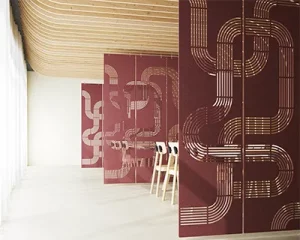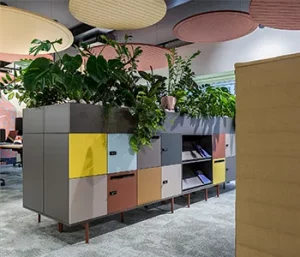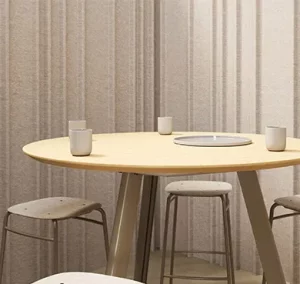Avoid your inquiry is delay response, please enter your WhatsApp/Skype along with the message, so we can contact you at the very first time.
We will reply you within 24 hours. If for urgent case, please add WhatsApp/WeChat: +86-13678899682 directly.
Open-plan rooms create din that breaks focus. Meetings spill over, phone calls echo, and privacy disappears. Soundproof upgrades feel hard. We show simple, proven steps that make your shared office quiet—fast.
To soundproof a shared office, combine PET panels on walls, soundproof partitions around cubicles, soft flooring, door seals, and a white noise machine. Re-balance office layout, treat the ceiling, and plug air gaps. These steps reduce noise, improve speech privacy, and lift productivity without major construction.
We are a professional manufacturer in China of high-quality PET and wood acoustic panels. For distributors, architects, contractors, and OEM/ODM brand owners, we design factory-direct packages that simplify specification, shorten lead times, and make installation easy.
When teams ask us how to soundproof a live space, we start with rapid wins. Add wall-mounted PET panels, seal doors, roll in soft rugs, and place soundproof partitions behind busy desk rows. This mix can reduce noise fast. It improves speech privacy and drops the noise level that drains attention.
Next, apply a simple hierarchy: first stop the source of the noise, then absorb sound, then block transfer. We specify PET wall panels to absorb sound waves, wood slat panels to cut sound reflection, and ceiling baffles for sound absorption. These soundproofing techniques give you effective soundproofing without dust or downtime.
Why us: as a manufacturer, we keep SKUs in stock, provide cut-to-size service, and ship globally with clear install guides—a good route to move from plan to a quieter work environment in days, not months.
In office cubicles, noise comes from people talking, ringing devices, HVAC whoosh, and footsteps (impact noise). Open gaps between cubicle panels allow sound transmission. Hard walls bounce sound waves, adding a lot of noise to the open office environment.
We map the areas of an office: phones and huddle spots, corridors around the office, printers, and kitchens. By placing soundproof panels near these hubs, using a divider where needed, and adding PET panels and tiles behind call points, you reduce sound before it spreads.
If you must soundproof an office cubicle, start with a tall sound barrier behind you and treat cubicle walls with PET felt. Add soundproof curtains at glass edges and a compact white noise machine for gentle masking. These choices absorb sound and stop sound “leaks.”
Place soundproof partitions between talkers and listeners. Under-desk mats cut chair roll noise. A small bookshelf with soft binders near the desk is an effective way to dampen sound. Each element is small, but together they create a quieter pod and cut down on noise.

sound barrier
In a bustling office, choose soundproofing materials with tested ratings. PET acoustic panels provide predictable NRC (how much they absorb sound) and slat acoustic panels on lath break up sound reflection. Pair them with acoustic ceiling baffles to capture overhead chatter and background noise.
PET is lightweight and clean-looking, ideal for different office themes. Wood slat designs blend with premium office furniture. Our factory supplies both, so you can match the floor plan while you soundproof the space and improve productivity.
NRC measures how well a surface absorbs sound; STC gauges how well constructions block noise. Use NRC for inside treatment and STC for doors, glazing, and walls in a soundproof office plan. We use NRC 0.75–0.95 PET acoustic panels to effectively reduce echo, then door seals to block sound across rooms.
Table: Typical ratings
| Component | What it does | Typical Range |
| PET wall acoustic panels | Absorb sound and reduce echo (NRC) | NRC 0.75–0.95 |
| Wood slat acoustic panels (with felt) | Add acoustic absorption and diffusion | NRC 0.60–0.85 |
| Solid core soundproof doors | Raise STC to stop noise from being transmitted | STC 32–40+ |
| Acoustic ceiling panels and baffles | Catch overhead chatter | NRC 0.70–0.90 |
| Seals, gaskets, sweeps | Prevent sound leaks at edges | — |
An open workspace is lively, but noise multiplies. Start with zoning: put calls and collab areas away from focus seating. Add movable soundproof screens and PET clouds. These soundproofing elements tune room sound while keeping the space flexible for a new office rollout.
Introduce gentle white noise to mask speech peaks (it’s a way to reduce distraction without changing habits). Choose adjustable white noise so teams can dial masking. Together with treatments, this drives lower noise and higher productivity.

PET clouds in an open office
Always install soundproof in the right order: fix gaps, then apply panels, then tune with masking. Use mechanical fasteners or adhesive strips suited to the substrate. For quiet cubicles, clamp baffles on top rails, then line backsides with PET felt. This using soundproof approach is tidy and reversible.
For ceilings, hang baffles perpendicular to talk rows to absorb sound. For walls, aim treatments midway between mouth and ear height—usually 1.0–1.5 m on site. Our kits include templates so crews finish fast and minimize office noise during work hours.
Yes. Tall spaces bounce sound waves; acoustic ceiling baffles interrupt paths and lower reverb. Think of them as nets that catch chatter. In tests, adding 25–35% overhead coverage can lower perceived noise by a third—teams feel calmer, and productivity rises as listening strain falls.
We design clouds as shapes that guide air and light. With PET density and thickness tuned, soundproofing and sound absorption stay balanced. This fits home office ideas too; the same physics helps when working from home and soundproofing a home office.
A 40-person sales floor had a lot of noise and poor call clarity. On Friday, crews added door seals, mounted PET walls, and placed mobile soundproof screens. They also set a white noise track. On Monday, the noise level was down, talk was clearer, and wins were up.
Results snapshot
Soundproofing aims to stop transfer and block sound through structures; acoustic absorption aims to soak up echo inside a room. You need both. Inside rooms we place PET acoustic panels; between rooms we add seals, dense doors, and layers like soundproof insulation for walls.
When teams mix them well, they get privacy and sound reduction. People feel safer sharing ideas, and office workers report fewer repeats on calls. We guide clients through soundproofing methods so they pick the right layer for the right task.
Good office layout puts quiet desks away from high traffic. Put printers and devices in alcoves, line corridors with slat panels, and use shelving to steer sound waves. In open-plan office floors, clusters of soft seating reduce noise levels in talk zones.
We supply ready-to-install kits sized to your workspace so crews can soundproof quickly. That’s a fast way to reduce reverb and raise clarity. It’s also an effective way to signal care for people.
Starter: PET wall kits, door seals, and a compact white noise machine. Mid: add mobile soundproof screens and ceiling baffles. Pro: integrate wood slat features, custom prints, and high-STC doors. All tiers include clear instructions to soundproof without hassle.
Table: Budget roadmap
| Tier | Focus | Expected Gains |
| Starter | Walls + doors + masking | Speech clarity, lower background noise |
| Mid | Add partitions + ceiling | Fewer distractions, stronger noise control |
| Pro | Full plan + doors | Best privacy, sharp noise reduction |

PET wall kit
Yes. For brand owners, we supply private-label packages and soundproofing solutions for fast retail rollouts. Architects get BIM blocks and specs for PET and wood, tuned to local codes. Contractors get palletized kits, labeled hardware, and staging tips that quiet an office efficiently.
Because we build both PET and wood lines, you can tune aesthetics and soundproofing ability. That flexibility makes soundproof choices easier across areas of an office—from reception to huddle rooms to training halls.
These are the essential ways to soundproof an office if you’re short on time:
Manufacturers control materials, capacity, and QC. We cut PET to length, preload hardware, and run fast lead times. That means lower risk and smoother installs. For soundproof cubicles and wall systems, that control helps quiet your office faster and more predictably.
We serve office cubicles at scale through distributors, supply OEM kits to brand programs, and support architects with samples. If you’re planning a rollout on site, talk to us early so we can stage shipments to match your timeline.
Note: unwanted sound matters when you plan your project.
Note: office soundproofing matters when you plan your project.
Note: open-plan office matters when you plan your project.
Note: cubicle noise matters when you plan your project.
Note: external noise matters when you plan your project.
Note: creating a soundproof matters when you plan your project.
Note: office setup matters when you plan your project.
Note: amount of noise matters when you plan your project.
Note: effective in reducing matters when you plan your project.
Can I install treatments during business hours without disruption?
Yes. Our kits mount cleanly. Crews work zone by zone to limit office noise and dust.
Do I need a contractor?
Small projects are DIY. Larger ones benefit from a licensed partner who can install soundproof systems quickly and safely.
How long does it take to soundproof your office space?
A single floor often completes in one weekend. We ship labeled pallets so teams can stage and finish on time.
What if I rent my space?
Most items are reversible. Use freestanding screens and low-impact mounts so you soundproof without damaging finishes.
Will this help remote teams?
Yes. The same thinking helps at home. Simple PET panels and a door sweep help when working from home and soundproofing a home office.
Are PET panels safe and recyclable?
PET is widely recycled. Our panels are low-VOC and meet global safety standards. Samples and test data are available on request.
As a factory specializing in PET and wood acoustic panels, we soundproof spaces with data-driven kits and real-world support. Share your floor plan, headcount, and priorities. We’ll return a quick layout, bill of materials, and lead time—so you can get back to work in a calmer, clearer workspace.
Because we run our own PET and wood lines, buying is simple. Share drawings or a marked plan with counts, finishes, and target dates. We return a take-off, pro-forma, and packing list. After approval, production starts immediately and shipments leave on a scheduled sail or flight. Typical lead time for stocked felt colors is 7–12 days; custom veneers vary by lot and region.
What you send us
What you get back
We include global certifications on request (e.g., low-VOC statements, fire ratings, and recycled content summaries) so your submittal package is complete. For brand owners, we print private labels, custom cartons, and QR manuals. For architects, we provide 3D blocks and detail sheets. For contractors, we offer site staging tips that keep teams moving and reduce callbacks.
Simple ROI example
If a 40-person floor reduces interruptions by only five minutes per person per day, that saves over 16 person-hours each week. Even at conservative labor rates, the improvement pays for a typical material package in just a few months. Gains continue, while maintenance remains low—panels can be vacuumed or wiped clean, and slat surfaces keep their finish for years.
Our service team stays available after delivery. If a project expands, we match dye lots and veneer runs so add-ons blend in. If schedules change, we can split shipments to meet phased openings. And if you need training, we offer short installer videos and coaching calls to keep quality consistent across sites.